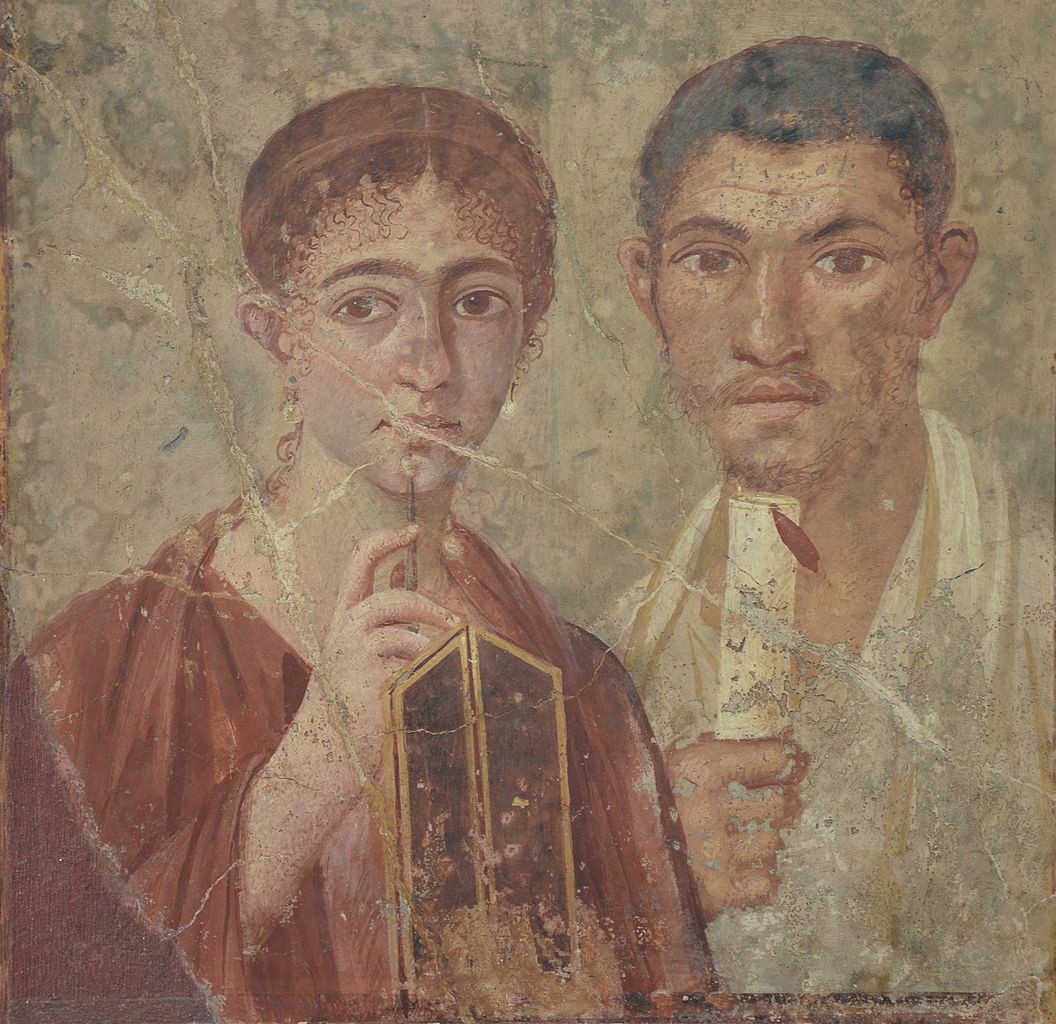61 I-Verb-e-ite-ere-iminī (F)
PōnePōnitePōnerePōniminī
Place!Place, you all!Be placedBe placed, you all!
Dīc!Dīcite!
Say!Say, you all!
Fer!Ferte!
Bring!Bring, you all!
Seek an empire in another land, and bring your people with you. (21)
Dīc mihi, Sulpicia: ubi ferrī dēbēs? (22)
“The perfect forms of I-Verbs have the usual perfect tense endings on their perfect stems:” You laid down your command, you remained at home. So you said. But did you seek peace? (23)
As Sulpicia came out of the building, Latinitas went up to her and handed her the letter on the tablets.
Ecce, litterae ab avunculō tuō. “Here, a letter from your uncle.”
Sulpicia grabbed the letter out of her hands and quickly broke the wax seal. It was a short message. She skimmed it and exclaimed Sublātum! Iter sublātum!, ‘Cancelled! The journey’s been cancelled!’ Agite, agite, Bura et mea nūtrix. Nunc iam Rōmam redīmus; hōc rūre horridō discēdēmus. ‘Come on, come on, Bura and my nurse. Now, now we are returning to Rome. We will depart from this horrible countryside’.”
It seemed that we had done a good thing. Why did Messalla change his mind? I asked.
“Before she departed this morning, Sulpicia left a copy of a poem in Messalla’s bedroom, one she wrote last night. It read:”
Invīsus nātālis adest, quī rūre molestō et sine Cērinthō trīstis agendus erit.
Dulcius urbe quid est? An vīlla sit apta puellae atque Arrentīnō frīgidus amnis agrō?
Iam nimium Messalla meī studiōse, quiescās; heu tempestīvae, saeve propinque, viae!
Hīc animum sēnsūsque meōs abducta relinquō:
arbitriō quamvīs nōn sinis esse meō.
“A hateful birthday is here, which, in the annoying countryside, and without Cerinthus, will have to be spent depressed.
What is sweeter than the city? Is a villa really suitable for a girl, and a cold stream in Arrentine land?
Already, Messalla, too studious over me, give it a rest; alas, cruel relative, a journey at this time!”
“What do each of the Latin words in the poem mean? See if you can guess from my translation.”
I got about twenty-five right, which was good. But then I asked her to translate the last two lines.
“I will help you with that:”
Hīc animum sēnsūsque meōsabducta (nom. sing. fem.)relinquō: arbitriōquamvīsnōnsinisessemeō.
abducted
however you mean ityou allow (me) (25)
She asked me to smooth this out, but I had a lot of trouble with the second line. It turns out that
arbitriō goes with meō, and they are both ablative. That was odd, since they are so far apart.
“Sulpicia is a very good poet, which means she writes in a very compressed, challenging Latin. You have just encountered some of the features that make it hard. It is unusually tricky. Messalla was impressed by her ars.”
Sulpicia took the tablet into the tavern, where she held it by the fire until the wax was soft enough for her to write on it again. She thought for a moment, dashed off a few words, and handed the tablet back to Latinitas, adding hoc Cerinthō, “This for Cerinthus.”
As the carriage was pulling out and we began riding back to Rome, Syrisca stepped out and began shouting. She was yelling at us for leaving without spending any money: Igitur nīl vultis? Est hic munda Ceres, est Amor, est Bromius! “So you want nothing? There is clean Ceres here, there is Love, there is Bromius!”
Latinitas helped me understand the names.
“Ceres is the goddess of grain, and means ‘bread’, and Bromius is Bacchus, the god of wine, and means wine.”
I nodded and turned back to look at her, and again I fell off my ass. Latinitas rolled her eyes, and let me struggle back on by myself. Once we were riding again and I caught up to her, she handed me the wax tablets that Sulpicia had given her.
“Here, read the message Sulpicia is sending to Cerinthus. Open it.” It was a short message that read:
Scīs? Iter ex animō sublātum triste puellae! Nātālī Rōmae iam licet esse suō.
which means:
“You know what? The depressing journey has been erased from your girl’s mind! Now it is allowed to be in Rome on her own birthday.”
“Sulpicia’s poems survived and now you can find them in library books, on the internet, in many different places.”

26. Portrait from the house of Terentius Neo, a baker, in Pompeii; the man (Terentius?) holds a rotulus (book-roll), and the woman (his wife?) holds tabellae (‘wax writing tablet’), which would be filled with cēra (‘wax’) and a stilus (‘pen’). circa (‘around’) 50-79 CE.